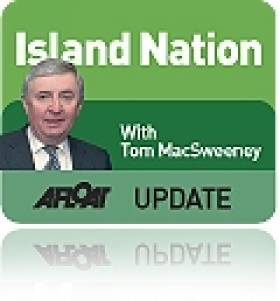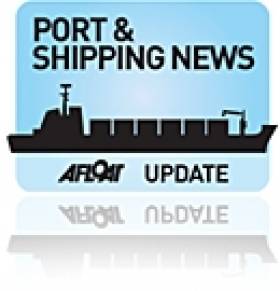Displaying items by tag: Sinead Reen
Why Sea Links Are More Important Than Air Links
#sealinks – In the current debate which has surfaced about the future of Aer Lingus, it is good to hear the realisation in all quarters, from politicians to business, economic and media commentators that Ireland is an 'island nation'. While the importance of air links is being highlighted, those same people could extend their thinking to the maritime links which keep this country alive in a way in which no air linkage can do.
This is emphasised in the leading story in the current edition of my radio programme, THIS ISLAND NATION which you can hear on this website, where I interview the first lady to become President of the Irish Institute of Master Mariners, the professional body for Shipmasters. Sea-going has been a male-dominated profession but Capt. Sinead Reen who lives in Crosshaven, Co.Cork, has done a lot to break that mould. She was also the first woman to qualify as a Deck Officer in Ireland and has served at sea on several types of vessels, including super tankers and cruise ships.
She describes in the interview how she chose a career at sea and, at a time when the Naval Service would not admit women, joined the Merchant Navy: "We are not seen by the general public because we are at sea, carrying the goods, the supplies, the imports, the exports, which this nation needs across the world's seaways. Without ships and seafarers this nation would find it difficult to exist." She discusses life at sea for a woman in a male environment aboardship and speaks of the great opportunities for employment at sea for both women and men. Her election underlines the opportunities of a career at sea for women in what has been a male-dominated profession.
It is an interview worth listening to, as is that about the commemorations planned in the Cork Harbour town of Cobh for the centenary of the sinking of the Lusitania in May.
Hendrik Verway, Chairman of Cobh Tourism, outlines the details of the commemorative plans. Cobh, where survivors of the Lusitania sinking by a German U-boat on May 7, 1915, were landed as well as the bodies of those who were killed in the tragedy, is planning ceremonies on the seafront at Cobh and a sail past by boats on the evening of May 7, with the vessels displaying a single white light to remember those who were killed. Two cruise ships will be in Cobh on the day. One of them, the Cunard's Queen Victoria, will be on a commemorative voyage and on Thursday afternoon, May 7, will sound her ship's whistle at the time at which the torpedo hit the Lusitania, to start a ceremony on the Cobh seafront . A quayside ceremony will start as the whistle sounds and which will conclude at 2.30 p.m., marking the time when the Lusitania sank beneath the waves. 1,198 passengers and crew died. Survivors were landed at Cobh, to where bodies of the dead were also brought and 169 buried. There were 764 survivors. Only 289 bodies were recovered. 169 are buried in the Old Cemetery in Cobh, 149 in three mass graves and 20 in individual plots. Amongst the commemorative events will be a series of lectures and an exhibition of photographs taken in Cobh, then called Queenstown, in the aftermath of the landing there of survivors and bodies by rescue vessels. Many of these photos have not been on public display before and have been digitised for exhibition from original glass plates photographed at the time, through the co-operation of the National Museum. It is also planned to re-enact the funeral of victims to the Old Cemetery in Cobh.
And in another interview on the programme, Paul Bourke of Inland Fisheries Ireland tells me that, for anglers, it has been a good year for the catching of specimen fish.
Fair Sailing...
First Woman Elected To Lead Master Mariners
#MasterMariners - The Irish Institute of Master Mariners, the professional body for shipmasters, has elected a woman to lead the organisation for the first time.
Capt Sinead Reen was also the first woman to qualify as a deck officer, having studied at CIT Cork where Nautical Science courses were held before they were transferred to the new National Maritime College at Ringaskiddy, where she now lectures.
She was also the first Irish woman to gain a Certificate of Competency as a Master Mariner and has served at sea aboard supertankers, but she now resides in Crosshaven with her husband, fellow Master Mariner Cormac MacSweeney.
Capt Reen's election underlines the opportunities of a career at sea for women in what has been a male-dominated profession.
The Irish Institute of Master Mariners promotes safe, efficient and professional conduct in the public and commercial maritime sectors. It is a member of the International Federation of Shipmaster's Associations and the Confederation of European Shipmasters.






























































